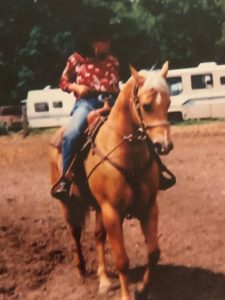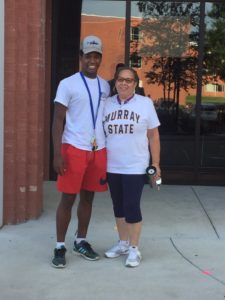Mason Galemore
Contributing Writer
mgalemore@murraystate.edu
Everyone has a story, but Patricia Eskridge, a 60-year-old non-traditional senior, has a unique story filled with resilience and redemption.
After receiving double brain surgery, Eskridge said her biggest regret if she had died would have been not receiving her doctorate degree, so she chose to attend Murray State to study psychology. Despite the hardships of relearning the most basic functions, she is on the path to graduation.
Eskridge grew up on a farm in Metropolis, Illinois, where her mother made clothing for the entire family by hand. Like clockwork, Eskridge and her large family would attend church every Sunday and Wednesday nights.
“I was the youngest of seven children,” Eskridge said “We basically raised all our own food and had to buy very little from the store.”
At a young age, Eskridge gained interest in how the human mind works, and this interest continued to grow as she did.

“I was interested in how the mind works, why people think the way they do and why individuals raised by the same parents make very different choices,” Eskridge said.
When Eskridge was only 25 years old, she began experiencing severe migraines, which were followed by years of trial and error of seeking treatment for her condition. No treatment seemed to help her.
“The medical advice was medication along with to stay in a dark, quiet room and let it wear off,” Eskridge said.
She tried this treatment for years then finally decided to go to Vanderbilt University Medical Center in Tennessee, but they too had no other treatment options for her.
In 2005, Eskridge’s symptoms had worsened to the point of incoherence, and her memory and cognitive skills had taken a turn for the worse.
“All I remember is my friend saying ‘you have been in bed for three days. I am going out to feed the horses and if you are not up when I get back you are going to the doctor,’” Eskridge said.
When her friend returned Eskridge was still in bed and she was then taken to the hospital where she received double brain surgery.
She remembers nothing of the journey to the hospital, preparing for surgery or that she was going to have a procedure at all.
“All I know is when I woke up my friend told me I had double brain surgery and to take my hands down from my head because half of my head was shaved, half staples and half stitched,” she said.
Eskridge had to relearn how to walk, speak, write and even eat after her surgery. Despite her psychological state, she could still retain numbers and codes as a result of working in a bank for several years.
“I could tell you anything that I knew before the surgery with numbers,” Eskridge said. “I could still recite it and even now I can not retain anything, but anything with numbers I can.”
Her main motivation for recovery was being able to go home and be with her family. Before she could achieve that, Eskridge had to complete a scavenger hunt to prove she was ready.
“The nurse gave me a certain amount of money and told me to go to a specific floor and buy her some coffee, and I had to make sure I got the correct change back and I had to take the stairs,” Eskridge said. “I also had to go to another floor and count the fish in an aquarium.”

After completing several other tasks in a 15-minute period, Eskridge passed the test and was finally able to return home. Her recovery was not complete, however, because it took another eight months for her to be able to function on her own.
After years of recovering, Eskridge decided to pursue her passion in psychology. Not being able to pursue this passion would have been her biggest regret if she had died.
“I would regret not getting my doctorate in psychology,” Eskridge said. “My doctor assigned me with the task of getting my transcripts and finding out what it would take to get into school.”
In 2016, Eskridge started school at Murray State. She assimilated into the college lifestyle while relearning things that seemed foreign to her.
“Everything was so elementary,” Eskridge said. “I was relearning everything for the very first time. When I started at Murray I didn’t even know what a laptop was. Talk about a challenge. Everything takes twice as long.”
Eskridge has received help from her academic advisors and her professors. She stresses the importance of good communication between students and professors.
“While attending Murray State, network as much as possible, do not be afraid to ask all the questions and use all your professors and career services as resources to help you to succeed and obtain your goals,” Eskridge said.
Along with her academics, Eskridge is a part of the National Society of Leadership and Success. She also cares for her 93-year-old mother.
“Everyday I can care for her is a true blessing for me,” Eskridge said. “Really isn’t that what psychology is all about: being a service to others. It needs to start at home.”
Eskridge also gave advice for students with disabilities.
“Talk with your professors and let them know exactly what your needs are,” Eskridge said. “They really do make themselves accessible to the students and they really care. If you are a student with a disability, go to the office of students with disabilities. They will advise you on what you need to do to get the help you need, whether it be a tutor or individual note taker or supplies.”